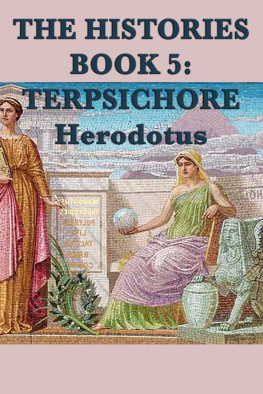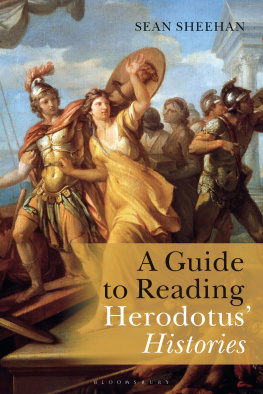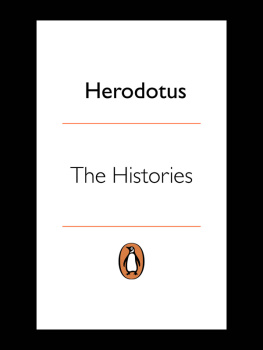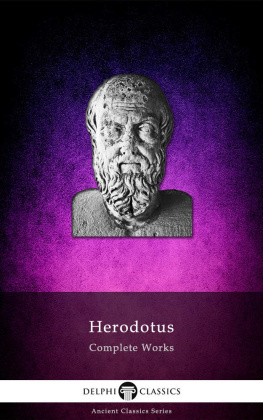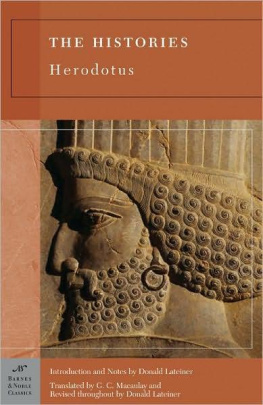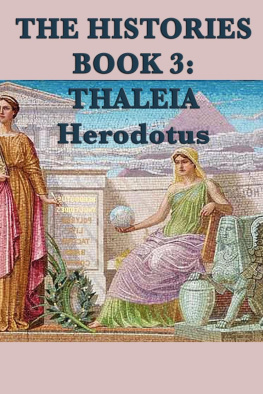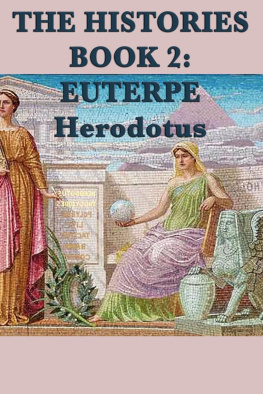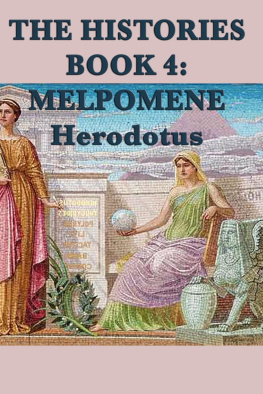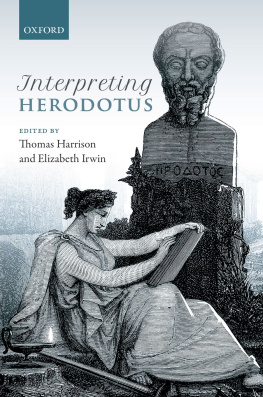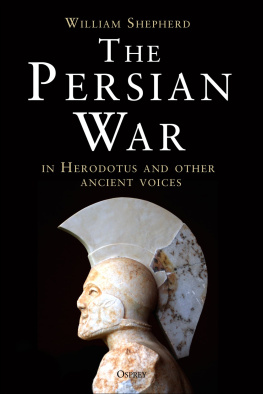The Histories
Book 5: Terpsichore
By Herodotus
The Histories Book 5: Terpsichore
1. In the meantime those of the Persians who had been left behind in Europe by Darius, of whom Megabazos was the commander, had subdued the people of Perinthos first of the Hellespontians, since they refused to be subject to Darius. These had in former times also been hardly dealt with by the Paionians: for the Paionians from the Strymon had been commanded by an oracle of their god to march against the Perinthians; and if the Perinthians, when encamped opposite to them, should shout aloud and call to them by their name, they were to attack them; but if they should not shout to them, they were not to attack them: and thus the Paionians proceeded to do. Now when the Perinthians were encamped opposite to them in the suburb of their city, a challenge was made and a single combat took place in three different forms; for they matched a man against a man, and a horse against a horse, and a dog against a dog. Then, as the Perinthians were getting the better in two of the three, in their exultation they raised a shout of paion, and the Paionians conjectured that this was the very thing which was spoken of in the oracle, and said doubtless to one another, Now surely the oracle is being accomplished for us, now it is time for us to act. So the Paionians attacked the Perinthians when they had raised the shout of paion, and they had much the better in the fight, and left but few of them alive.
2. Thus it happened with respect to those things which had been done to them in former times by the Paionians; and at this time, although the Perinthians proved themselves brave men in defence of their freedom, the Persians and Megabazos got the better of them by numbers. Then after Perinthos had been conquered, Megabazos marched his army through the length of Thracia, forcing every city and every race of those who dwell there to submit to the king, for so it had been commanded him by Darius, to subdue Thracia.
3. Now the Thracian race is the most numerous, except the Indians, in all the world: and if it should come to be ruled over by one man, or to agree together in one, it would be irresistible in fight and the strongest by far of all nations, in my opinion. Since however this is impossible for them and cannot ever come to pass among them, they are in fact weak for that reason. They have many names, belonging to their various tribes in different places; but they all follow customs which are nearly the same in all respects, except the Getai and Trausians and those who dwell above the Crestonians.
4. Of these the practices of the Getai, who believe themselves to be immortal, have been spoken of by me already: and the Trausians perform everything else in the same manner as the other Thracians, but in regard to those who are born and die among them they do as follows:when a child has been born, the nearest of kin sit round it and make lamentation for all the evils of which he must fulfil the measure, now that he is born, enumerating the whole number of human ills; but when a man is dead, they cover him up in the earth with sport and rejoicing, saying at the same time from what great evils he has escaped and is now in perfect bliss.
5. Those who dwell above the Crestonians do as follows:each man has many wives, and when any man of them is dead, a great competition takes place among his wives, with much exertion on the part of their friends, about the question of which of them was most loved by their husband; and she who is preferred by the decision and so honoured, is first praised by both men and women, then her throat is cut over the tomb by her nearest of kin, and afterwards she is buried together with her husband; and the others are exceedingly grieved at it, for this is counted as the greatest reproach to them.
6. Of the other Thracians the custom is to sell their children to be carried away out of the country; and over their maidens they do not keep watch, but allow them to have commerce with whatever men they please, but over their wives they keep very great watch; and they buy their wives for great sums of money from their parents. To be pricked with figures is accounted a mark of noble rank, and not to be so marked is a sign of low birth. Not to work is counted most honourable, and to be a worker of the soil is above all things dishonourable: to live on war and plunder is the most honourable thing.
7. These are their most remarkable customs; and of the gods they worship only Ares and Dionysos and Artemis. Their kings, however, apart from the rest of the people, worship Hermes more than all gods, and swear by him alone; and they say that they are descended from Hermes.
8. The manner of burial for the rich among them is this:for three days they expose the corpse to view, and they slay all kinds of victims and feast, having first made lamentation. Then they perform the burial rites, either consuming the body with fire or covering it up in the earth without burning; and afterwards when they have heaped up a mound they celebrate games with every kind of contest, in which reasonably the greatest prizes are assigned for single combat. This is the manner of burial among the Thracians.
9. Of the region lying further on towards the North of this country no one can declare accurately who the men are who dwell in it; but the parts which lie immediately beyond the Ister are known to be uninhabited and vast in extent. The only men of whom I can hear who dwell beyond the Ister are those who are said to be called Sigynnai, and who use the Median fashion of dress. Their horses, it is said, have shaggy hair all over their bodies, as much as five fingers long; and these are small and flat-nosed and too weak to carry men, but when yoked in chariots they are very high-spirited; therefore the natives of the country drive chariots. The boundaries of this people extend, it is said, to the parts near the Enetoi, who live on the Adriatic; and people say that they are colonists from the Medes. In what way however these have come to be colonists from the Medes I am not able for my part to conceive, but everything is possible in the long course of ages. However that may be, the Ligurians who dwell in the region inland above Massalia call traders sigynnai, and the men of Cyprus give the same name to spears.
10. Now the Thracians say that the other side of the Ister is occupied by bees, and that by reason of them it is not possible to pass through and proceed further: but to me it seems that when they so speak, they say that which is not probable; for these creatures are known to be intolerant of cold, and to me it seems that the regions which go up towards the pole are uninhabitable by reason of the cold climate. These then are the tales reported about this country; and however that may be, Megabazos was then making the coast-regions of it subject to the Persians.
11. Meanwhile Darius, so soon as he had crossed over the Hellespont and come to Sardis, called to mind the service rendered to him by Histiaios the Milesian and also the advice of the Mytilenian Cos, and having sent for them to come to Sardis he offered them a choice of rewards. Histiaios then, being despot of Miletos, did not make request for any government in addition to that, but he asked for the district of Myrkinos which belonged to the Edonians, desiring there to found a city. Histiaios chose this for himself; but Cos, not being a despot but a man of the people, asked to be made despot of Mitylene.
12. After the desires of both had been fulfilled, they betook themselves to that which they had chosen: and at this same time it chanced that Darius saw a certain thing which made him desire to command Megabazos to conquer the Paionians and remove them forcibly from Europe into Asia: and the thing was this:There were certain Paionians named Pigres and Mantyas, who when Darius had crossed over into Asia, came to Sardis, because they desired themselves to have rule over the Paionians, and with them they brought their sister, who was tall and comely. Then having watched for a time when Darius took his seat publicly in the suburb of the Lydian city, they dressed up their sister in the best way they could, and sent her to fetch water, having a water-jar upon her head and leading a horse after her by a bridle round her arm, and at the same time spinning flax. Now when the woman passed out of the city by him, Darius paid attention to the matter, for that which was done by the woman was not of Persian nor yet of Lydian fashion, nor indeed after the manner of any people of Asia. He sent therefore some of his spearmen, bidding them watch what the woman would do with the horse. They accordingly followed after her; and she having arrived at the river watered the horse, and having watered him and filled her jar with the water, she passed along by the same way, bearing the water upon her head, leading the horse after her by a bridle round her arm, and at the same time turning the spindle.

